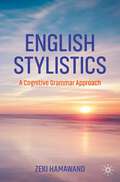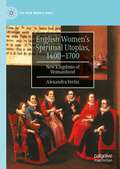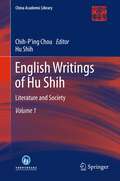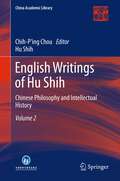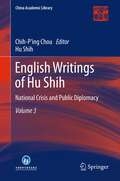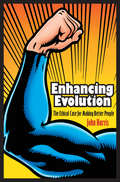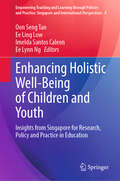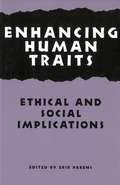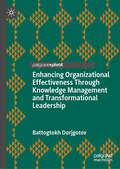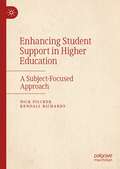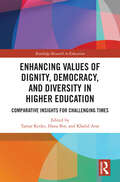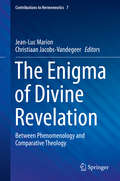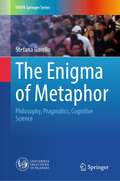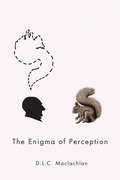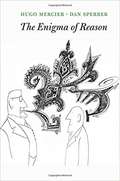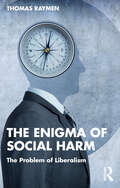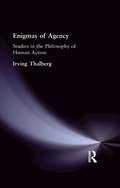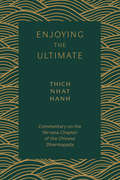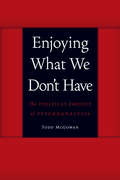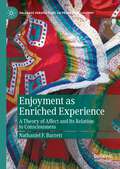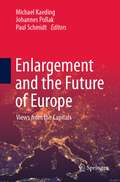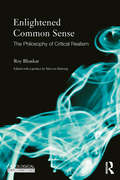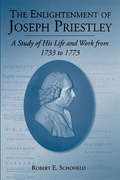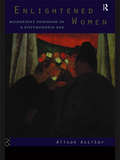- Table View
- List View
English-Speaking Justice
by George GrantEnglish-Speaking Justice was first delivered during The Josiah Wood Lectures at Mount Allison University in 1974 and was published by the University in 1978. Anansi is pleased to co-publish the present edition with the University of Notre Dame Press. The text is essentially the same as the Mount Allison edition, except for the expansion of certain citations in the footnotes.
English Stylistics: A Cognitive Grammar Approach
by Zeki HamawandThis accessible textbook hinges on the central assumptions of Cognitive Linguistics and Cognitive Grammar, introducing students to the analytical tools they need to approach Stylistics, an essential area in language analysis. The author verifies the claim that alterations in style, triggered by different cognitive processes, reflect alterations in meaning, and shows how they are employed to achieve particular effects in context. The book links theory with practice, aiming both to acquaint students with the cognitive principles that account for stylistic expressions, and to provide them with the tools and techniques to conduct their own analyses. The textbook explores and explains how writers use the resources of language to create meaning, and how readers interpret texts. It will be of interest to advanced undergraduate and postgraduate students on courses in English Linguistics, as well as those working on other languages and in related areas such as Composition and Creative Writing.
English Women’s Spiritual Utopias, 1400-1700: New Kingdoms of Womanhood (The\new Middle Ages Ser.)
by Alexandra VeriniEnglish Women’s Spiritual Utopias, 1400-1700: New Kingdoms of Womanhood uncovers a tradition of women’s utopianism that extends back to medieval women’s monasticism, overturning accounts of utopia that trace its origins solely to Thomas More. As enclosed spaces in which women wielded authority that was unavailable to them in the outside world, medieval and early modern convents were self-consciously engaged in reworking pre-existing cultural heritage to project desired proto-feminist futures. The utopianism developed within the English convent percolated outwards to unenclosed women's spiritual communities such as Mary Ward's Institute of the Blessed Virgin and the Ferrar family at Little Gidding. Convent-based utopianism further acted as an unrecognized influence on the first English women’s literary utopias by authors such as Margaret Cavendish and Mary Astell. Collectively, these female communities forged a mode of utopia that drew on the past to imagine new possibilities for themselves as well as for their larger religious and political communities. Tracking utopianism from the convent to the literary page over a period of 300 years, New Kingdoms writes a new history of medieval and early modern women’s intellectual work and expands the concept of utopia itself.
English Writings of Hu Shih, Volume 1: Literature and Society
by Chih-Ping Chou Hu ShihHu Shih (1891-1962),. In the 1910s, Hu studied at Cornell University and later Columbia University, both in the United States. At Columbia, he was greatly influenced by his professor, John Dewey, and became a lifelong advocate of pragmatic evolutionary change. He received his Ph.D. in Philosophy in 1917 and returned to lecture at Peking University. Hu soon became one of the leading and most influential intellectuals during the May Fourth Movement and later the New Culture Movement. His most widely recognized achievement during this period was as a key contributor to Chinese liberalism and language reform in his advocacy for the use of written vernacular Chinese. Hu Shih was the Republic of China’s Ambassador to the United States of America (1938-1942) and later Chancellor of Peking University (1946-1948). In 1939 Hu Shih was nominated for a Nobel Prize in literature and in 1958 became president of the “Academia Sinica” in Taiwan, where he remained until his death in Nangang at the age of 71.<P> This diverse collection brings together his English essays, speeches and academic papers, as well as book reviews, all written between 1919 and 1962. English Writings of Hu Shih represents his thinking and insights on such topics as scientific methodology, liberalism and democracy, and social problems. It can also serve as a helpful resource for those who study Hu Shih and his views on ancient and modern China.<P><P> The first volume “Chinese Philosophy and Intellectual History” allows readers to trace the development of Chinese thought and see the historical methodology applied therein. The second volume “Literature and Society” mainly includes Hu Shih’s works on language reform, which owing to his advocacy for the use of written vernacular Chinese were a success in both the educational and literary fields. The third volume “National Crisis and Public Diplomacy” mainly collects Hu’s articles and speeches from his term as Ambassador of China to the U.S.A. between 1938 and 1942.
English Writings of Hu Shih, Volume 2: Chinese Philosophy and Intellectual History
by Chih-Ping Chou Hu ShihHu Shih (1891-1962),. In the 1910s, Hu studied at Cornell University and later Columbia University, both in the United States. At Columbia, he was greatly influenced by his professor, John Dewey, and became a lifelong advocate of pragmatic evolutionary change. He received his Ph.D. in Philosophy in 1917 and returned to lecture at Peking University. Hu soon became one of the leading and most influential intellectuals during the May Fourth Movement and later the New Culture Movement. His most widely recognized achievement during this period was as a key contributor to Chinese liberalism and language reform in his advocacy for the use of written vernacular Chinese. Hu Shih was the Republic of China’s Ambassador to the United States of America (1938-1942) and later Chancellor of Peking University (1946-1948). In 1939 Hu Shih was nominated for a Nobel Prize in literature and in 1958 became president of the “Academia Sinica” in Taiwan, where he remained until his death in Nangang at the age of 71.<P> This diverse collection brings together his English essays, speeches and academic papers, as well as book reviews, all written between 1919 and 1962. English Writings of Hu Shih represents his thinking and insights on such topics as scientific methodology, liberalism and democracy, and social problems. It can also serve as a helpful resource for those who study Hu Shih and his views on ancient and modern China.<P><P> The first volume “Chinese Philosophy and Intellectual History” allows readers to trace the development of Chinese thought and see the historical methodology applied therein. The second volume “Literature and Society” mainly includes Hu Shih’s works on language reform, which owing to his advocacy for the use of written vernacular Chinese were a success in both the educational and literary fields. The third volume “National Crisis and Public Diplomacy” mainly collects Hu’s articles and speeches from his term as Ambassador of China to the U.S.A. between 1938 and 1942.
English Writings of Hu Shih, Volume 3: National Crisis and Public Diplomacy
by Chih-Ping Chou Hu ShihHu Shih (1891-1962),. In the 1910s, Hu studied at Cornell University and later Columbia University, both in the United States. At Columbia, he was greatly influenced by his professor, John Dewey, and became a lifelong advocate of pragmatic evolutionary change. He received his Ph.D. in Philosophy in 1917 and returned to lecture at Peking University. Hu soon became one of the leading and most influential intellectuals during the May Fourth Movement and later the New Culture Movement. His most widely recognized achievement during this period was as a key contributor to Chinese liberalism and language reform in his advocacy for the use of written vernacular Chinese. Hu Shih was the Republic of China’s Ambassador to the United States of America (1938-1942) and later Chancellor of Peking University (1946-1948). In 1939 Hu Shih was nominated for a Nobel Prize in literature and in 1958 became president of the “Academia Sinica” in Taiwan, where he remained until his death in Nangang at the age of 71.<P> This diverse collection brings together his English essays, speeches and academic papers, as well as book reviews, all written between 1919 and 1962. English Writings of Hu Shih represents his thinking and insights on such topics as scientific methodology, liberalism and democracy, and social problems. It can also serve as a helpful resource for those who study Hu Shih and his views on ancient and modern China.<P><P> The first volume “Chinese Philosophy and Intellectual History” allows readers to trace the development of Chinese thought and see the historical methodology applied therein. The second volume “Literature and Society” mainly includes Hu Shih’s works on language reform, which owing to his advocacy for the use of written vernacular Chinese were a success in both the educational and literary fields. The third volume “National Crisis and Public Diplomacy” mainly collects Hu’s articles and speeches from his term as Ambassador of China to the U.S.A. between 1938 and 1942.
Enhancing Evolution: The Ethical Case for Making Better People (Science Essentials Ser.)
by John HarrisIn Enhancing Evolution, leading bioethicist John Harris dismantles objections to genetic engineering, stem-cell research, designer babies, and cloning and makes an ethical case for biotechnology that is both forthright and rigorous. Human enhancement, Harris argues, is a good thing--good morally, good for individuals, good as social policy, and good for a genetic heritage that needs serious improvement. Enhancing Evolution defends biotechnological interventions that could allow us to live longer, healthier, and even happier lives by, for example, providing us with immunity from cancer and HIV/AIDS. Further, Harris champions the possibility of influencing the very course of evolution to give us increased mental and physical powers--from reasoning, concentration, and memory to strength, stamina, and reaction speed. Indeed, he says, it's not only morally defensible to enhance ourselves; in some cases, it's morally obligatory. In a new preface, Harris offers a glimpse at the new science and technology to come, equipping readers with the knowledge to assess the ethics and policy dimensions of future forms of human enhancement.
Enhancing Holistic Well-Being of Children and Youth: Insights from Singapore for Research, Policy and Practice in Education (Empowering Teaching and Learning through Policies and Practice: Singapore and International Perspectives #4)
by Ee Ling Low Oon Seng Tan Imelda Santos Caleon Ee Lynn NgThis book documents and chronicles current research and initiatives, and growing knowledge base about well-being, in a Singapore context. In Singapore, the well-being of children and youth has been the subject of research and policy efforts. This is reflective of global and national concerns on the care of the young and those at risk of maladaptive outcomes, the nurturing of emotional health and resilience, and development of social and psychological resources. The chapters present a brief yet comprehensive summary of current insights on the well-being of children, adolescents, teachers, parents, and caregivers within the context of Singapore. This book highlights important issues and gaps in research related to the well-being of children and adolescents that are also relevant to the global community. It also provides recommendations for future directions that will be useful to researchers, policymakers, practitioners, parents, and other key stakeholders.
Enhancing Human Traits: Ethical and Social Implications
by Erik ParensIn this volume, scholars from philosophy, sociology, history, theology, women's studies, and law explore the looming ethical and social implications of new biotechnologies that are rapidly making it possible to enhance an individual's mental and physical attributes in ways previously only imagined. To clarify the issues, the contributors grapple with the central concept of "enhancement" and probe the uses and abuses of the term. Focusing in particular on the moral issues pertaining to cosmetic surgery and cosmetic psychopharmacology (a category which includes Prozac), they also examine notions of identity, authenticity, normality, and complicity. Other essays in this collection address the social ramifications of the new technologies, including the problems of access and fairness.
Enhancing Organizational Effectiveness Through Knowledge Management and Transformational Leadership
by Battogtokh DorjgotovThis book introduces the study of the impacts on organizational culture, strategy, technology, human resource development (HRD), transformational leadership, knowledge management, and organizational effectiveness using a hypothesis-driven model. The model posits that organizational culture, technology, strategy, and HRD are essential preconditions for effective knowledge management, which is further enhanced by transformational leadership. Focusing on Research and Development (R&D) organizations, specifically the research institutes of the Mongolian Academy of Sciences, the study examines how these factors collectively improve organizational effectiveness. Concluding with practical recommendations for R&D specialists and managers, the book offers insights into enhancing organizational efficiency through strategic leadership and robust knowledge management practices.
Enhancing Student Support in Higher Education: A Subject-Focused Approach
by Nick Pilcher Kendall RichardsThis book is about supporting students in Higher Education using language, and specifically using a combination of written text based linguistic approaches alongside and with other non-text related languages. The authors call this a beyond-text subject based approach and argue that this can more effectively help students. The book first outlines and describes a ‘paradigm of linguistics’ that sees support as being only possible through linguistics written text approaches. It then describes how the authors have found through their own research studies that such approaches do not go far enough to best support students. They offer alternatives and justify them theoretically and empirically, and also suggest ways in which others can use similar approaches to best support students in HE. This book will be of interest to practitioners, students, teachers and researchers in the fields of Applied Linguistics, TESOL, English Medium Instruction (EMI), EAP and language education policy.
Enhancing Values of Dignity, Democracy, and Diversity in Higher Education: Comparative Insights for Challenging Times (Routledge Research in Higher Education)
by Tamar Ketko, Hana Bor, and Khalid ArarContesting a gradual disregard for the values of Dignity, Democracy, and Diversity in higher education, this volume explores best practices from universities and colleges in Israel and the USA to illustrate how these values can offer a holistic values framework for higher education globally. Presenting a range of interdisciplinary chapters from fields including history, philosophy, memorial studies, cultural, political, gender, and religious studies, the text considers how these values can be reflected in policy and practice across all areas of the university, including teaching and learning, admissions, students’ affairs, staff well-being, and institutional identity. The volume highlights constructive theories, experimental models, and case studies that collectively inform a holistic framework for moral, ethical, and equitable higher education worldwide. Offering key insights into the relevant discourse regarding local and global events that have impacted both Israelis and Americans, this volume will appeal to researchers in the fields of higher education, sociology of education, and philosophy of education, as well as postgraduates and scholars with interests in the transformation of higher education in light of contemporary times and challenges.
The Enigma of Divine Revelation: Between Phenomenology and Comparative Theology (Contributions to Hermeneutics #7)
by Jean-Luc Marion Christiaan Jacobs-VandegeerThis volume explores the possibilities and pressures of the language of revelation on human understanding. How can we critically account for divine self-disclosure in the linguistically mediated world of human concerns? Does the structure of interpretation limit the language of revelation? Does revelation open up new horizons of critical interpretation? The volume brings together theologians who approach the interactions of revelation and hermeneutics with different perspectives, including various forms of phenomenology and comparative theology. It approaches the theme of revelation – central as it is to the theological endeavour – from several angles rather than a single methodological program. Dealing as it does with revelation and understanding, the volume addresses the foundational issues at stake in the challenges around change, identity, and faithfulness currently facing the church.
The Enigma of Metaphor: Philosophy, Pragmatics, Cognitive Science (UNIPA Springer Series)
by Stefana GarelloThis book deals with the complicated realm of metaphor, an enigma deeply embedded in language and cognition. There has been much discussion of metaphor in the past, but it was characterized by a certain fragmentation and lacked interdisciplinarity. In this field of study, the dominance of Cognitive Linguistics, epitomized by the Conceptual Metaphor Theory of George Lakoff and Mark Johnson, has caused the marginalization of alternative perspectives. To fill this gap, this book embarks on an interdisciplinary journey, inviting different theoretical frameworks to engage in a fruitful dialog. It navigates the labyrinth of theories and illuminates the nuanced facets of metaphor.At the center of this exploration are three central questions: whether metaphor belongs to the realm of style or thought, the intricate interplays between literal and metaphorical meanings and the integration of propositional and non-propositional elements in the construction of metaphorical meaning.Through a careful blend of historical analysis and contemporary hypotheses, the book unravels the complexities of metaphor, considering its evolution across the centuries and the myriad interpretations it evokes. By bringing together work from different fields, it ultimately shows that a definition of metaphor is theory-dependent and that metaphor is not a natural kind, but a complex and multifaceted philosophical concept whose study requires a multi-dimensional approach that transcends narrow theoretical boundaries. In this way, the book explores these considerations’ most important philosophical consequences and offers new insights into this fundamental aspect of human language.
The Enigma of Perception
by D. L. C. MaclachlanHow do we acquire knowledge through a sensory input from our environment? In The Enigma of Perception, D.L.C. Maclachlan revives the traditional causal representative theory of perception which dominated philosophical thinking for hundreds of years by revealing the important element of truth the theory contained. The traditional theory was not a complete explanation of perception, because it presupposed a causal system including both the physical objects and the subjective experiences. The pattern of inference from sensations to external objects, which lies at its heart, is nevertheless legitimate, because the assumptions on which it depends are generally recognized as true. The emerging enigma is how to explain this original knowledge of the world on which the traditional theory depends. The key idea is that sense experience is constructed as a response to sensory input - an act whose purpose is to represent a reality beyond the cognitive subject. The Enigma of Perception develops original ideas to explain this process in detail, with help from numerous philosophers from John Locke to David Chalmers.
The Enigma of Reason
by Hugo MercierIf reason is so useful and reliable, why didn’t it evolve in other animals and why do humans produce so much thoroughly reasoned nonsense? Hugo Mercier and Dan Sperber argue that reason is not geared to solitary use. It evolved to help justify our beliefs to others, evaluate their arguments, and better exploit our uniquely rich social environment.
The Enigma of Social Harm: The Problem of Liberalism
by Thomas RaymenDrawing on a novel blend of moral philosophy, social science, psychoanalytic theory and continental philosophy, this book offers up a diagnosis of contemporary liberal capitalist society and the increasingly febrile culture we occupy when it comes to matters of harm. On what basis can we say that something is harmful? How are we supposed to judge between competing opinions on the harmfulness of a particular behaviour, practice, or industry? Can we avoid drifting off into relativism when it comes to judgements about harm? In an age of deep cultural and political discord about what is and is not harmful, providing answers to such questions is more important than ever. Appraising the current state of the concept of social harm in academic scholarship and every-day life, Thomas Raymen finds a concept in an underdeveloped state of disorder, trapped in interminable deadlocks and shrill disagreements about what should and should not be considered harmful. To explain the genesis of this conceptual crisis and identify what we need to do to resolve it, The Enigma of Social Harm travels from Graeco-Roman antiquity to the present day, exploring trends and developments in moral and political philosophy, religion, law, political economy, and culture. Along the way, we see how such trends and developments have not only made it more difficult to establish a shared basis for evaluating harm, but that the tools which might enable us to do so are now outright prohibited by the political-economic, cultural, and ethical ideology of liberalism that dominates contemporary society. Written in a clear and accessible style, it is essential reading for all those interested in matters of social harm, justice, politics, and ethics.
Enigmas of Agency: Studies in the Philosophy of Human Action
by Irving ThalbergFirst published in 2002. Routledge is an imprint of Taylor & Francis, an informa company.
Enjoying the Ultimate: Commentary on the Nirvana Chapter of the Chinese Dharmapada
by Thich Nhat HanhFor Buddhists seeking perfection, the Sanskrit word "nirvana" is held as the unreachable goal. But in this definitive, direct translation of the Chinese Dharmapada by Zen Master Thich Nhat Hanh, nirvana is not what you think it is."Nirvana is our daily business," Thich Nhat Hanh says. Based on talks given in his home monastery of Plum Village in France at the peak of his long teaching career, The Nirvana Chapter conveys Thich Nhat Hanh's insights on the 36 verses on nirvana in the Chinese Dharmapada. Described there as "the absence of notions that cause suffering," we discover that nirvana can be experienced at any time. Previously unavailable in English, these teachings on the experiential path which can help us touch nirvana are an "instant classic" for Buddhists and meditation practitioners.With his fluency in Classical Chinese and his knowledge of Sanskrit and Pali, Thich Nhat Hanh is the perfect guide to lead the way to a new understanding of nirvana for an international audience. Through his commentary, ranging freely in his vast knowledge of Vietnamese Buddhist history, we gain a master practitioner's view of a tradition of Zen Buddhism that has been, until now, inaccessible to Western students. We also gain insights into the elusive "space outside of space" of nirvana's ultimate dimension.
Enjoying What We Don't Have: The Political Project of Psychoanalysis (Symploke Studies in Contemporary Theory)
by Todd McGowanAlthough there have been many attempts to apply the ideas of psychoanalysis to political thought, this book is the first to identify the political project inherent in the fundamental tenets of psychoanalysis. And this political project, Todd McGowan contends, provides an avenue for emancipatory politics after the failure of Marxism in the twentieth century.Where others seeking the political import of psychoanalysis have looked to Freud&’s early work on sexuality, McGowan focuses on Freud&’s discovery of the death drive and Jacques Lacan&’s elaboration of this concept. He argues that the self-destruction occurring as a result of the death drive is the foundational act of emancipation around which we should construct our political philosophy. Psychoanalysis offers the possibility for thinking about emancipation not as an act of overcoming loss but as the embrace of loss. It is only through the embrace of loss, McGowan suggests, that we find the path to enjoyment, and enjoyment is the determinative factor in all political struggles—and only in a political project that embraces the centrality of loss will we find a viable alternative to global capitalism.
Enjoyment as Enriched Experience: A Theory of Affect and Its Relation to Consciousness (Palgrave Perspectives on Process Philosophy)
by Nathaniel F. BarrettThis book has two main tasks: (1) to call attention to the special challenges presented by our experience of affect—all varieties of pleasure and pain—and (2) to show how these challenges can be overcome by an “enrichment approach” that understands affect as the enrichment or deterioration of conscious activity as a whole. This “enrichment approach” draws from Alfred North Whitehead as well as the pragmatists John Dewey and William James, all of whom thought of affect as a fundamental aspect of experience rather than a special class of feelings. It also draws from recent scientific research that suggests that the dynamic repertoire of consciousness can change, effectively expanding and contracting our capacity to feel. Weaving these perspectives together, the book develops a theory that accounts for the peculiar phenomenology of affect and sheds new light on a diverse range of experiences, from everyday pleasures and pains to the special satisfactions of the arts and religious festivity. At the same time, it presents a fresh and distinctively affect-centered perspective on the nature of consciousness.
Enlargement and the Future of Europe: Views from the Capitals
by Michael Kaeding Johannes Pollak Paul SchmidtThis book analyses Member States’ and EU neighbours’ national visions for the enlargement of the European Union (EU), highlighting 41 national histories, policies, and corresponding public perceptions of European integration. In a geopolitical context in which Russia’s war of aggression in Ukraine has renewed the impetus for EU enlargement, national views vary considerably on the timing, conditions, and reforms necessary to welcome Eastern neighbours and the Western Balkans countries into the European family. Moreover, EU enlargement policy is not only an investment in peace and stability; it has also become a political tool in response to the exploitation of interdependencies and illiberal pressures. This book presents concrete policy recommendations to national governments and the EU on how to move forward productively.
Enlightened Common Sense: The Philosophy of Critical Realism
by Roy BhaskarSince the 1970s, critical realism has grown to address a range of subjects, including economics, philosophy, science, and religion. It has become a complex and mature philosophy. Enlightened Common Sense: The Philosophy of Critical Realism looks back over this development in one concise and accessible volume. The late Roy Bhaskar was critical realism’s philosophical originator and chief exponent. He draws on a lifetime’s experience to give a definitive, systematic account of this increasingly influential, international and multidisciplinary approach. Critical realism’s key element has always been its vindication and deepening of our understanding of ontology. Arguing that realist ontology is inexorable in knowledge and action, Bhaskar sees this as the key to a new enlightened common sense. From the definition of critical realism and its applicability in the social sciences, to explanation of dialectical critical realism and the philosophy of metaReality, this is the essential introduction for students of critical realism.
The Enlightened Joseph Priestley: A Study of His Life and Work from 1733 to 1773
by Robert SchofieldJoseph Priestley (1733–1804) is one of the major figures of the English Enlightenment. A contemporary and friend of Benjamin Franklin and Thomas Jefferson, he exceeded even these polymaths in the breadth of his curiosity and learning. Yet no one has attempted an all-inclusive biography of Priestley, probably because he was simply too many persons for anyone easily to comprehend in a single study. Robert Schofield has devoted a lifetime of scholarship to this task. The result is a magisterial book, covering the life and works of Priestley during the critical first forty years of his life. <P><P>Although Priestley is best known as a chemist, this book is considerably more than a study in the history of science. As any good biographer must, Schofield has thoroughly studied the many activities in which Priestley was engaged. Among them are theology, electricity, chemistry, politics, English grammar, rhetoric, and educational philosophy. Schofield situates Priestley, the provincial dissenter, within the social, political, and intellectual contexts of his day and examines all the works Priestley wrote and published during this period. <P><P>Schofield singles out the first forty years of Priestley's life because these were the years of preparation and trial during which Priestley qualified for the achievements that were to make him famous. The discovery of oxygen, the defenses of Unitarianism, and the political liberalism that characterize the mature Priestley—all are foreshadowed in the young Priestley. A brief epilogue looks ahead to the next thirty years when Priestley was forced out of England and settled in Pennsylvania, the subject of Schofield's next book. But this volume stands alone as the definitive study of the making of Joseph Priestley.
Enlightened Women: Modernist Feminism in a Postmodern Age
by Alison AssiterThis is a bold and controversial feminist, philosophical critique of postmodernism. Whilst providing a brief and accessible introduction to postmodernist feminist thought, Enlightened Women is also a unique defence of realism and enlightenment philosophy. The first half of the book covers an analysis of some of the most influential postmodernist theorists, such as Luce Irigaray and Judith Butler. In the second half Alison Assiter advocates a return to modernism in feminism. She argues, against the current orthodoxy, that there can be a distinction between "sex" and "gender". For students trying to pick their way through the maze of literature in the area of postmodernist feminism, Enlightened Women is a concise guide to contemporary thought - as well as a radical contribution to the debate.

